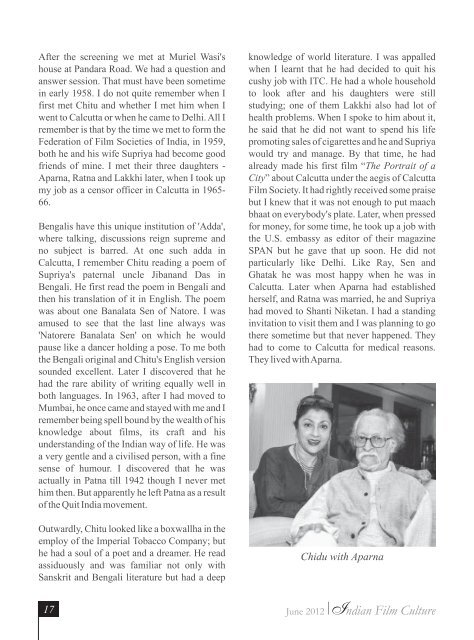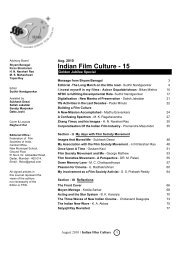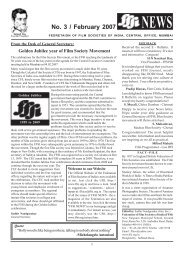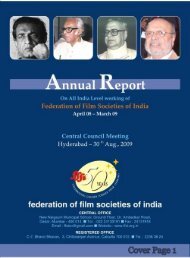Indian Film Culture - 16.cdr - federation of film societies of india
Indian Film Culture - 16.cdr - federation of film societies of india
Indian Film Culture - 16.cdr - federation of film societies of india
You also want an ePaper? Increase the reach of your titles
YUMPU automatically turns print PDFs into web optimized ePapers that Google loves.
After the screening we met at Muriel Wasi's<br />
house at Pandara Road. We had a question and<br />
answer session. That must have been sometime<br />
in early 1958. I do not quite remember when I<br />
first met Chitu and whether I met him when I<br />
went to Calcutta or when he came to Delhi. All I<br />
remember is that by the time we met to form the<br />
Federation <strong>of</strong> <strong>Film</strong> Societies <strong>of</strong> India, in 1959,<br />
both he and his wife Supriya had become good<br />
friends <strong>of</strong> mine. I met their three daughters -<br />
Aparna, Ratna and Lakkhi later, when I took up<br />
my job as a censor <strong>of</strong>ficer in Calcutta in 1965-<br />
66.<br />
Bengalis have this unique institution <strong>of</strong> 'Adda',<br />
where talking, discussions reign supreme and<br />
no subject is barred. At one such adda in<br />
Calcutta, I remember Chitu reading a poem <strong>of</strong><br />
Supriya's paternal uncle Jibanand Das in<br />
Bengali. He first read the poem in Bengali and<br />
then his translation <strong>of</strong> it in English. The poem<br />
was about one Banalata Sen <strong>of</strong> Natore. I was<br />
amused to see that the last line always was<br />
'Natorere Banalata Sen' on which he would<br />
pause like a dancer holding a pose. To me both<br />
the Bengali original and Chitu's English version<br />
sounded excellent. Later I discovered that he<br />
had the rare ability <strong>of</strong> writing equally well in<br />
both languages. In 1963, after I had moved to<br />
Mumbai, he once came and stayed with me and I<br />
remember being spell bound by the wealth <strong>of</strong> his<br />
knowledge about <strong>film</strong>s, its craft and his<br />
understanding <strong>of</strong> the <strong>Indian</strong> way <strong>of</strong> life. He was<br />
a very gentle and a civilised person, with a fine<br />
sense <strong>of</strong> humour. I discovered that he was<br />
actually in Patna till 1942 though I never met<br />
him then. But apparently he left Patna as a result<br />
<strong>of</strong> the Quit India movement.<br />
Outwardly, Chitu looked like a boxwallha in the<br />
employ <strong>of</strong> the Imperial Tobacco Company; but<br />
he had a soul <strong>of</strong> a poet and a dreamer. He read<br />
assiduously and was familiar not only with<br />
Sanskrit and Bengali literature but had a deep<br />
17<br />
knowledge <strong>of</strong> world literature. I was appalled<br />
when I learnt that he had decided to quit his<br />
cushy job with ITC. He had a whole household<br />
to look after and his daughters were still<br />
studying; one <strong>of</strong> them Lakkhi also had lot <strong>of</strong><br />
health problems. When I spoke to him about it,<br />
he said that he did not want to spend his life<br />
promoting sales <strong>of</strong> cigarettes and he and Supriya<br />
would try and manage. By that time, he had<br />
already made his first <strong>film</strong> “The Portrait <strong>of</strong> a<br />
City” about Calcutta under the aegis <strong>of</strong> Calcutta<br />
<strong>Film</strong> Society. It had rightly received some praise<br />
but I knew that it was not enough to put maach<br />
bhaat on everybody's plate. Later, when pressed<br />
for money, for some time, he took up a job with<br />
the U.S. embassy as editor <strong>of</strong> their magazine<br />
SPAN but he gave that up soon. He did not<br />
particularly like Delhi. Like Ray, Sen and<br />
Ghatak he was most happy when he was in<br />
Calcutta. Later when Aparna had established<br />
herself, and Ratna was married, he and Supriya<br />
had moved to Shanti Niketan. I had a standing<br />
invitation to visit them and I was planning to go<br />
there sometime but that never happened. They<br />
had to come to Calcutta for medical reasons.<br />
They lived with Aparna.<br />
Chidu with Aparna<br />
June 2012<br />
<strong>Indian</strong> <strong>Film</strong> <strong>Culture</strong>





